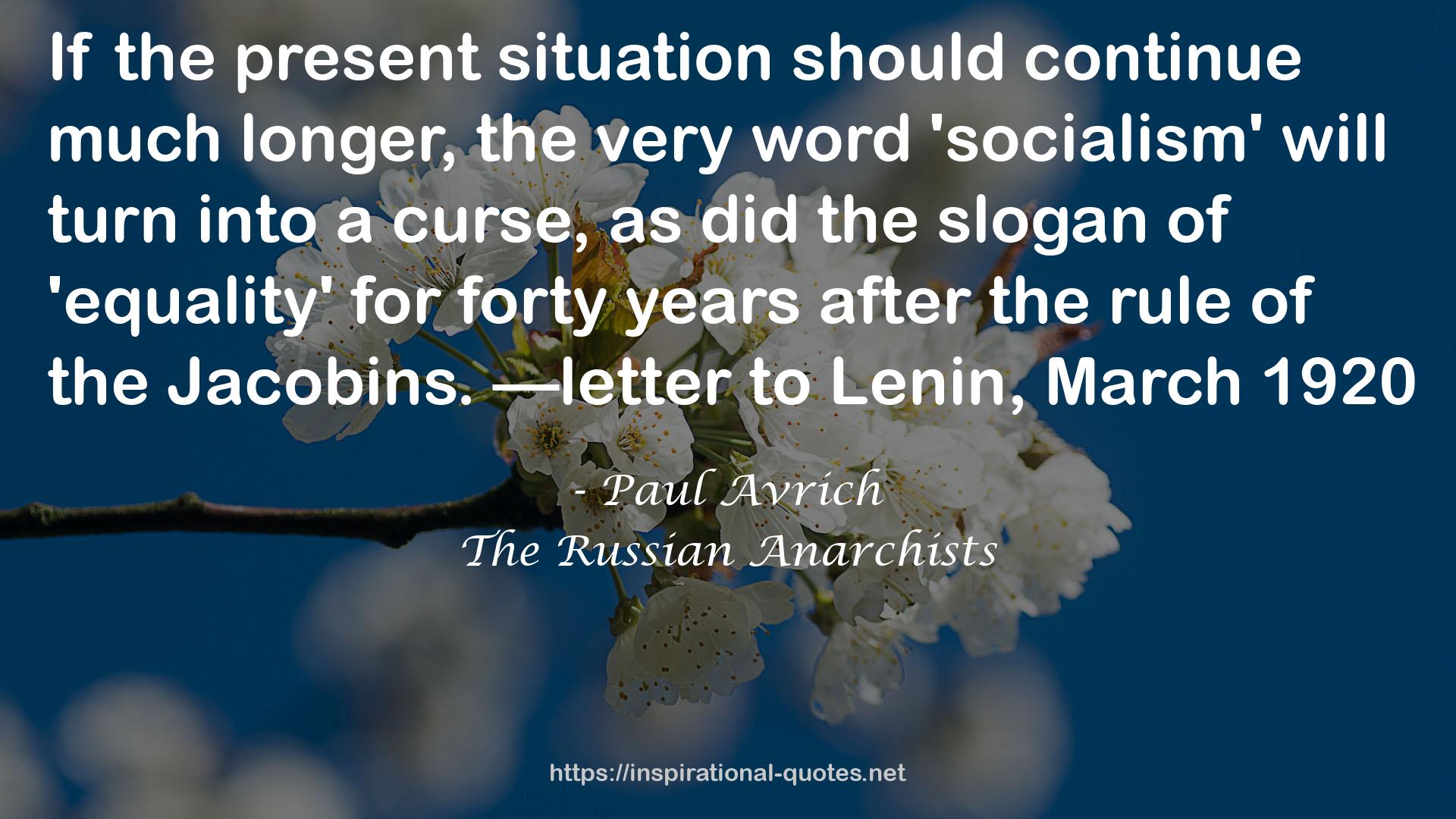Paul Avrich QUOTES
3 " While entrusting the intellectuals with a critical role in the forthcoming revolution, Bakunin at the same time cautioned them against attempting to seize political power on their own, in the manner of the Jacobins or their eager disciple Auguste Blanqui. On this point Bakunin was most emphatic. The very idea that a tiny band of conspirators could execute a coup d'état for the benefit of the people was, in his derisive words, a "heresy against common sense and historical experience." These strictures were aimed as much at Marx as at Blanqui. For both Marx and Bakunin, the ultimate goal of the revolution was a stateless society of men liberated from the bonds of oppression, a new world in which the free development of each was the condition for the free development of all. But where Marx envisioned an intervening proletarian dictatorship that would eliminate the last vestiges of the bourgeois order, Bakunin was bent on abolishing the state outright. The cardinal error committed by all revolutions of the past, in Bakunin's judgment, was that one government was turned out only to be replaced by another. The true revolution, then, would not capture political power; it would be a social revolution, ridding the world of the state itself. "
4 " Bakunin, on the other hand, considered himself a revolutionist of the deed, "not a philosopher and not an inventor of systems, like Marx." He adamantly refused to recognize the existence of any "a priori ideas or preordained, preconceived laws." Bakunin rejected the view that social change depended on the gradual maturation of "objective" historical conditions. On the contrary, he believed that men shaped their own destinies, that their lives could not be squeezed into a Procrustean bed of abstract sociological formulas. "No theory, no ready-made system, no book that has ever been written will save the world," Bakunin declared. "I cleave to no system, I am a true seeker." Mankind was not compelled to wait patiently as the fabric of history unfolded in the fullness of time. By teaching the working masses theories, Marx would only succeed in stifling the revolutionary ardor every man already possessed—"the impulse to liberty, the passion for equality, the holy instinct of revolt. "
5 " For all his saintly qualities, however, Kropotkin by no means offered blanket opposition to the use of violence. He upheld the assassination of tyrants if the perpetrators were impelled by noble motives, though his acceptance of bloodshed in such instances was inspired by compassion for the oppressed rather than by any personal hatred of the ruling despots. Kropotkin believed that acts of terror were among the very few means of resistance available to the enchained masses; they were useful as "propaganda by the deed," calculated to supplement oral and written propaganda in awakening the rebellious instincts of the people. Nor did Kropotkin shrink from revolution itself, for he hardly expected the propertied classes to give up their privileges and possessions without a fight. Like Bakunin, he anticipated an upheaval that would demolish capitalism and the state for all time. Nevertheless, he earnestly hoped that the rebellion would be a tame one, with "the smallest number of victims, and a minimum of embitterment." Kropotkin's revolution was to be speedy and humane—quite unlike Bakunin's demonic visions of fire and brimstone. "
6 " Bakunin perceived the authoritarianism inherent in a so-called dictatorship of the proletariat. The state, he insisted, however popular in form, would always serve as a weapon of exploitation and enslavement. He predicted the inevitable formation of a new "privileged minority" of savants and experts, whose superior knowledge would enable them to use the state as an instrument to rule over the uneducated manual laborers in the fields and factories. The citizens of the new people's state would be rudely awakened from their self-delusion to discover that they had become "the slaves, the playthings, and the victims of a new group of ambitious men." The only way the common people could escape this lamentable fate was to make the revolution themselves, total and universal, ruthless and chaotic, elemental and unrestrained. "It is necessary to abolish completely, in principle and in practice, everything that might be called political power," Bakunin concluded, "for so long as political power exists, there will always be rulers and ruled, masters and slaves, exploiter and exploited". "

